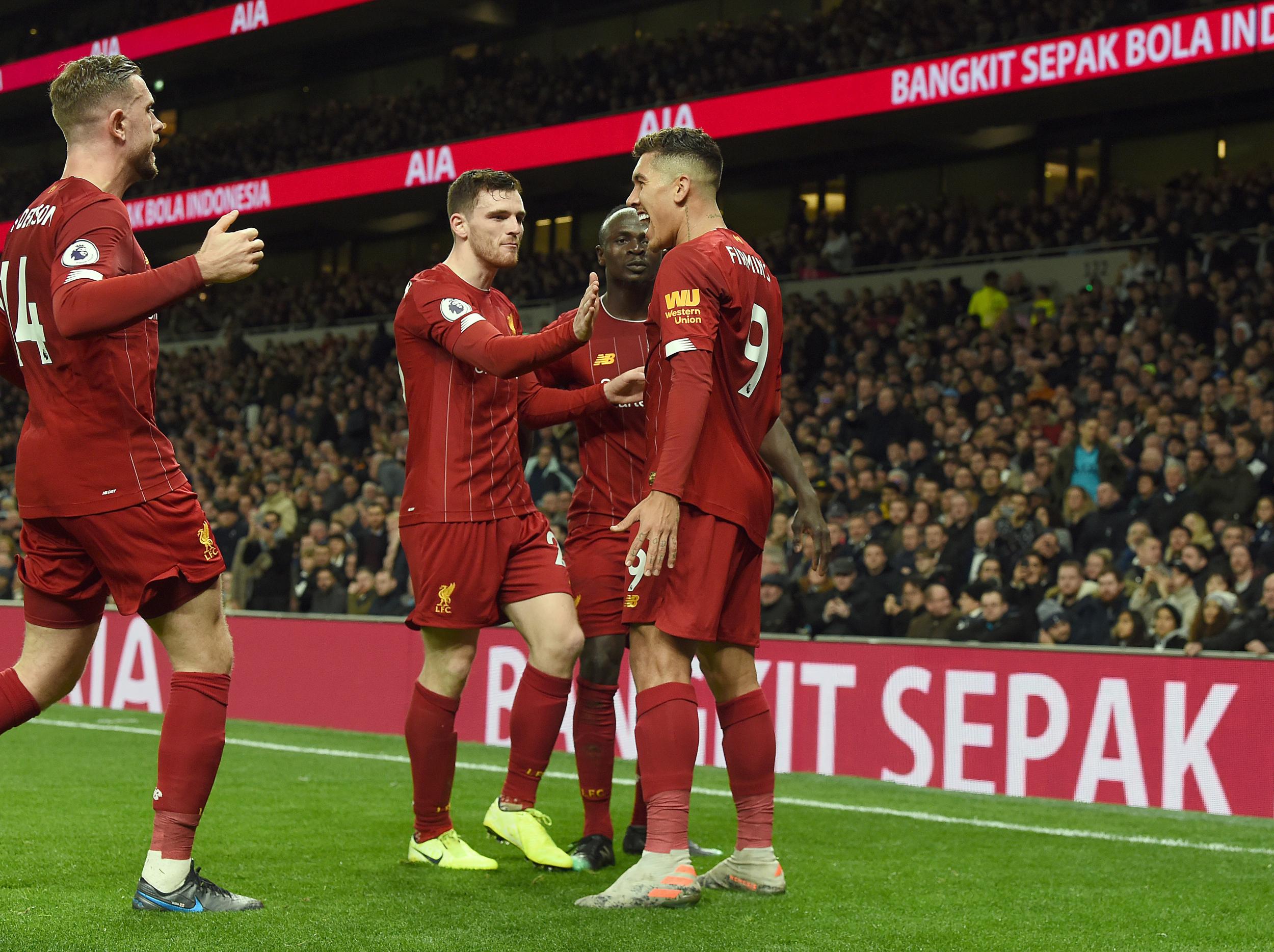Roberto Firmino the difference as relentless Liverpool extend Premier League lead with Tottenham win
Tottenham Hotspur 0-1 Liverpool: Mourinho’s team barely even bothered attempting to win a match settled by Firmino’s fine first-half goal

Yet another win for Liverpool, but from another Jose Mourinho match that often felt as much a boardroom pitch about transfers as an actual football match.
This was a 1-0 that – barring an admittedly tense opening half-hour until Roberto Firmino’s goal – just had the uncomplicated sense of job done for Liverpool. Tottenham Hotspur didn’t really give them much to worry about other than two snatched late chances, as their entire gameplan seemed solely concerned with spoiling. That has succeeded for Mourinho in the past on occasions he has utterly relished, but this Liverpool are too good, that approach a little too spent. There was a hit-and-hope late Spurs rally, sure, but that felt more a consequence of a rare occasion when a more erratic Liverpool didn't press home rather than any constructive play. Laments about late misses are cancelled out by the reality Liverpool should have been out of sight by half-time.
Mourinho might well say that’s a natural reaction when you are facing a team who have – still – only dropped two points this season, but a fair response would be that this is a natural consequence when you set up like this; when you seem set to make points about transfers like this.
If Liverpool’s record of 20 wins from 21 games isn’t all that healthy for football, brilliant as they themselves are as a side, what does Mourinho’s approach mean for football? He should try playing some.
Ceding ground like a small club in this way doesn’t cut it even against a side as historically excellent as Liverpool, and even with Spurs’ injuries. Mourinho has structural problems in the squad, sure, but there are as many in his tactics.
Where is the evolution he spoke of when he took this job? Where were any patterns of attacking play?
Mourinho instead turned to his old playbook, going for one of those classic wild-card moves to energise a spoiling game by giving Japhet Tanganga his Premier League debut in defence. Against Liverpool. It was daunting, although the 20-year-old performed well in the circumstances.
Tanganga’s very first touch in Premier League football gave him some feel of the level, but also very quickly set the entire feel of the game. He brilliantly blocked a Roberto Firmino hammer before more deftly – if luckily – deflecting an Alex Oxlade-Chamberlain rebound.
It should really have been a goal, and thereby felt like a goal for Spurs, which was pretty much an insight into the mentality of both teams.
Spurs were suddenly fired for battle and defiance.
Liverpool were primed for patience and perseverance. They had 81% possession by the 20th minute, but only one big chance through Virgil van Dijk’s header, that was so supremely parried away by Andre Gazzinaga.
The big problem with such an approach when you’re the team in Spurs’ position, though, is that you have nowhere to go once it’s rumbled. And a rumbling is statistically much more likely the more that you sit off and invite the opposition on. So many moments become mere percentage plays, as was pretty much the case with every awkward Davinson Sanchez header or Toby Alderweireld clearance.
And there’s no side better at playing those percentages than Liverpool, given this is what they’re specifically prepared for through their pressing. The goal offered a classic example of that.
There was such an admirable and clearly learned composure to Mohamed Salah when the ball finally dropped for Klopp’s side in the box, and he knowingly laid it off for Firmino rather than turning to shoot himself.
That composure was complemented by the pure release of the Brazilian’s strike, which felt like all of Liverpool’s frustration so far distilled into one divine finish.
And that was pretty much that.

Spurs had to try and go from waiting for Liverpool moves to break down to trying to construct play themselves. That is always a difficult in-match switch, but all the more so when your manager has spent the week preparing you for a spoiling game. And even more so when the manager is Mourinho, whose career has for years been built on reactive football.
It does raise lingering questions about what the Portuguese is actually trying to do with this team, and what his self-proclaimed tactical evolution is supposed to be. It still looks so stale, entirely dependent on moments of instinct and individualism rather than collective patterns. Son Heung-Min’s instinct wasn’t at its sharpest, however, as he badly blazed over Spurs’ only good chance from one of those hopeful charges. Giovani Lo Celso meanwhile looked like he could do with more match-time, as he diverted their best chance wide.
It also raises questions about how much he has actually improved Spurs since taking over from Mauricio Pochettino. A number of concerns have very quickly abounded.
There are no such questions about Klopp, and especially not from the rest of the Premier League. There’s certainly no staleness, either. An electricity remains.
They just find another solution to another approach. They just knock another team back.
Their record remains almost flawless, like the team. Mourinho certainly could find any flaws. But then he barely seemed to try.
Join our commenting forum
Join thought-provoking conversations, follow other Independent readers and see their replies
Comments